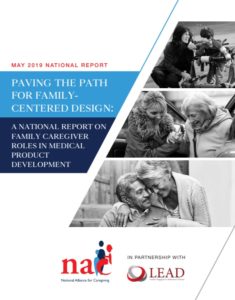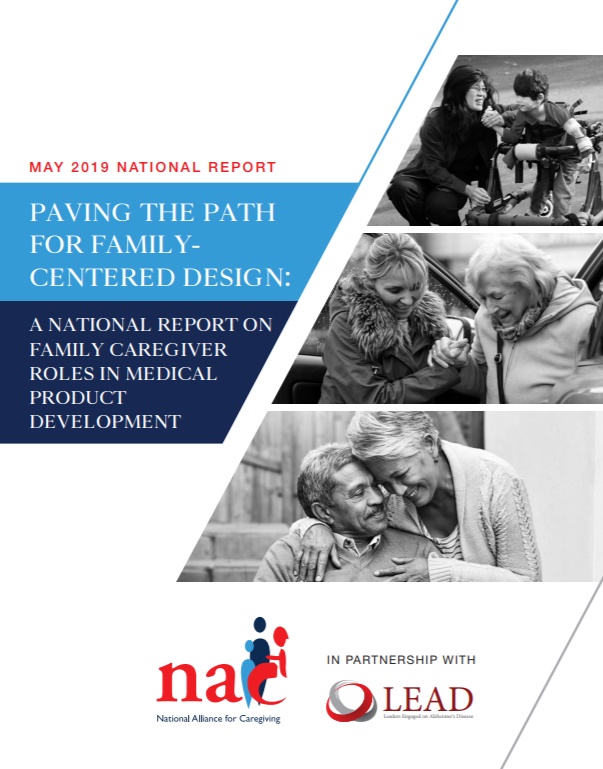
For the first time, a newly-released report, resulting from a one-day summit, “Paving the Path for Family-Centered Design: A National Report on Family Caregiver Roles in Medical Product Development,” explores the vital roles that family caregivers can play in shaping biomedical research and development, regulatory decision-making and healthcare delivery. Specifically, the report begins a dialogue on how to incorporate the critical knowledge of caregivers in developing pharmaceutical products, biotechnology therapies, and medical devices. It presents recommendations for leveraging the enormous – and largely untapped – a reservoir of information and observations of caregivers about the conditions their care recipients experience and health outcomes. Approximately 43.5 million people provide unpaid caregiving services to Americans of all ages, 60% of whom have a long-term health condition.
 “Friends and family who care for people with disabilities or illness often have insights that can help innovators understand how drugs and devices are being used in the real world,” said C. Grace Whiting, J.D., President and CEO of the National Alliance for Caregiving (NAC). NAC, in partnership with Leaders Engaged on Alzheimer’s Disease (the LEAD Coalition), hosted the national summit on Family Caregiver Roles in Patient-Focused Medical Development in November 2018 — convening 50 professionals representing many disciplines and organizations — ranging from patient advocacy groups, to pharmaceutical company representatives and regulatory agency staff to explore ways that family caregivers can contribute to the development and delivery of medical therapies. “Participants agreed that it is time to illuminate a new dimension in the science of patient input by distinguishing the role of the caregiver as a vital resource and stakeholder,” said Ian Kremer, Executive Director of the LEAD Coalition.
“Friends and family who care for people with disabilities or illness often have insights that can help innovators understand how drugs and devices are being used in the real world,” said C. Grace Whiting, J.D., President and CEO of the National Alliance for Caregiving (NAC). NAC, in partnership with Leaders Engaged on Alzheimer’s Disease (the LEAD Coalition), hosted the national summit on Family Caregiver Roles in Patient-Focused Medical Development in November 2018 — convening 50 professionals representing many disciplines and organizations — ranging from patient advocacy groups, to pharmaceutical company representatives and regulatory agency staff to explore ways that family caregivers can contribute to the development and delivery of medical therapies. “Participants agreed that it is time to illuminate a new dimension in the science of patient input by distinguishing the role of the caregiver as a vital resource and stakeholder,” said Ian Kremer, Executive Director of the LEAD Coalition.
Report Findings and Recommendations
“Paving the Path” provides background on ways in which patient perspectives are beginning to inform and shape key decisions about biomedical research and development. The report also defines the roles caregivers can play in the medical product development process. Caregivers can act as observers, reporters, surrogates, and proxies, as needed and wanted by their care recipient. The report examines each stage of medical product R&D, building on existing patient engagement models to highlight where caregiver insights might be most useful. For example, in the discovery & pre-clinical phase caregivers can provide meaningful observations to help build an understanding of the history of a condition and can share their own impressions of research priorities, as well as articulating those as reporters, surrogates, or proxies for their care recipients. During regulatory review caregivers can participate in regulatory meetings to articulate the unmet needs of patients, benefit expectations, and tolerability of tradeoffs for side effects or other adverse events; can participate in market research to inform packaging, labeling, and patient-facing materials; and contribute to programs to address Risk Evaluation and Mitigation Strategies (REMS).
A Caregiver’s Perspective
A participant in the national summit, Mousumi Bose, shared first-hand how a caregiver’s perspective can inform medical care and potential medical product development. Her first son, Ilan, was born with a severe form of a progressive genetic disorder called Zellweger spectrum disorder. Nearly all organ systems are involved and children rarely survive into adulthood. Ilan’s life was even shorter. “I was Ilan’s full-time caregiver and the expert on how he was doing each day,” Mousumi stated. She and her husband were methodical about administering Ilan’s complicated medication regimen on schedule and in the correct dosages. “We were responsible for relaying all this information to the doctors and for making the call as to whether he needed to be hospitalized. I know from my own experience and that of the families that I work with, the caregiver holds a different, more comprehensive understanding of these rare diseases than the medical experts who study them. There is a lot that goes under the radar at the clinical level that family caregivers see on a day-to-day basis. Their viewpoint is essential,” she added.
The report sets forth potential actions to advance caregiver participation in patient-focused medical product development, including leveraging existing policy, enhancing emerging practices and pursuing new possibilities. A multi-disciplinary, multi-stakeholder Caregiver Pathways Task Force has been named to prioritize actions, expand the national discussion and galvanize a movement to better integrate caregivers and their perspectives. Venues for potential action include implementation of FDA Reauthorization Act and 21st Century Cures Act; development of a National Family Caregiving Strategy under the RAISE Family Caregivers Act, ongoing PFMPD/PFDD activities and more.
Get the Report
The report and related materials are available at http://www.caregiving.org/innovation
and http://www.leadcoalition.org/resources.
About the National Alliance for Caregiving
Established in 1996, the National Alliance for Caregiving is a non-profit coalition of national organizations focusing on advancing family caregiving through research, innovation, and advocacy. The Alliance conducts research, does policy analysis, develops national best-practice programs, and works to increase public awareness of family caregiving issues. Recognizing that family caregivers provide important societal and financial contributions toward maintaining the well-being of those they care for, the Alliance supports a network of more than 80 state and local caregiving coalitions and serves as Secretariat for the International Alliance of Carer Organizations (IACO).
About the LEAD Coalition
Leaders Engaged on Alzheimer’s Disease (LEAD Coalition) is a diverse and growing national coalition of 100 member organizations committed to stopping Alzheimer’s disease and other forms of dementia, including vascular disease, Lewy body dementia, and frontotemporal degeneration. The coalition works collaboratively to focus the nation’s attention on accelerating transformational progress in: (1) care and support to enrich the quality of life of those with dementia and their caregivers; (2) detection and diagnosis; and (3) research leading to prevention, effective treatment, and eventual cures. LEAD Coalition members include patient advocacy organizations and health non-profits, philanthropies and foundations, trade and professional associations, academic research and clinical institutions, home and residential care providers, and biotechnology and pharmaceutical companies.

